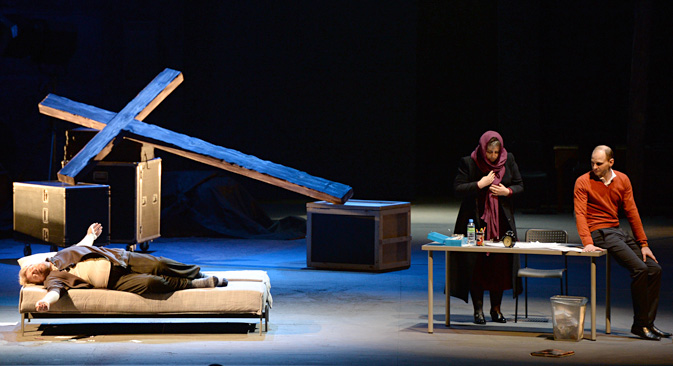Experts fear Tannhauser case a warning, despite dismissal

From left: Soloist of the Royal Danish Opera Stig Anderson in the role of Tannhauser, Irina Churilova as Elizabeth and Pavel Jankowski as Wolfram von Eschenbach in Richard Wagner's opera Tannhauser directed by Timofey Kulyabin on the stage of the Novosibirsk State Opera and Ballet Theatre. Source: Alexander Kryazhev / RIA Novosti
Timofei Kulyabin intended his new staging of Richard Wagner’s opera Tannhauser at the Novosibirsk State Academic Theater of Opera and Ballet to explore “the theme of human existential solitude,” but the local representative of the Russian Orthodox Church found issue with the way it presented people coming together.
The church took Kulyabin, 30, to court over the staging of the opera, which has the protagonist, Heinrich Tannhauser, showing an audience an erotic film, Venus' Grotto, which reveals a young Jesus' carnal delights in the grotto of the goddess of love.
The critically acclaimed production premiered in December 2014 and the Kommersant called it of the 10 best premiers in Russia last year. But only a month after its first staging, a local church representative complained to the procurator’s office that Kulyabin and theater director Boris Mezdrich had intentionally defiled religious symbols. The procurator filed an administrative lawsuit against Kulyabin and Mezdrich for having publically desecrated the Gospel image of Jesus Christ – a crime that carries a fine of 200,000 rubles.
After receiving complaints from several citizens that the performance insulted believers, the local branch of Russia’s Investigative Committee opened an inquiry into charges that the production “violates the right to freedom of conscience and faith.” That crime that carries a punishment of one year of incarceration.
Orthodox activists also demanded that Tannhauser be excluded from the theater’s repertoire, although theater representatives already announced their intention "to defend its professional position and artistic policy."
Meanwhile an initiative collecting signatures in defense of the accused was launched on the Internet. The petition, which was signed by 50,000 people, also asked to the court hearing the case to get opinions from independent experts, which it did.
After examining the case, Vladimir Vinokurov, a professor in the religious studies department at Moscow State University said: "The opera does not contain elements of religious reverence and liturgical literature.”
Another religious scholar, Boris Falikov, of the Russian State University of the Humanities, noted: "There are emblems and signs that represent ideological symbolism, but they are not sullied or destroyed." He added, “Kulyabin does not want to offend anyone…. If the spectator identifies fantasy with reality and the protagonist with the author, this is a mistake."
A victory?
The case against Kulyabin was dismissed, but for the professional artistic community, the Tannhauser case is another sign that the church is trying to censor cultural works that it doesn’t like.
Alexander Kalyagin, president of the Russian Theatrical Union, said that the situation reminded him of recent demands "to take action" in relation to Andrei Zvyagintsev's award-winning film Leviathan. "I wouldn't like to return to the times of raging censorship," Kalyagin said.
Oleg Tabakov, artistic director of the Moscow Art Theater, wrote on the theater’s Facebook page: "The fact that a criminal lawsuit has been filed against the artistic work, as controversial and ambiguous as it is, cannot but evoke alarm,” and President of the Guild of Theatrical Directors Valery Fokin told the procurator's office that the negative reaction of just one of the many segments of the audience "cannot be the basis for public discussion," or "a reason for inviting the author to the procurator's office."
Read more: Moscow’s oddestpuppettheater: Ambulances, ShakespearemenusandLilikans>>>
The quirky projects organized by the Ten’ theater set it apart from others.
All rights reserved by Rossiyskaya Gazeta.
Subscribe
to our newsletter!
Get the week's best stories straight to your inbox

